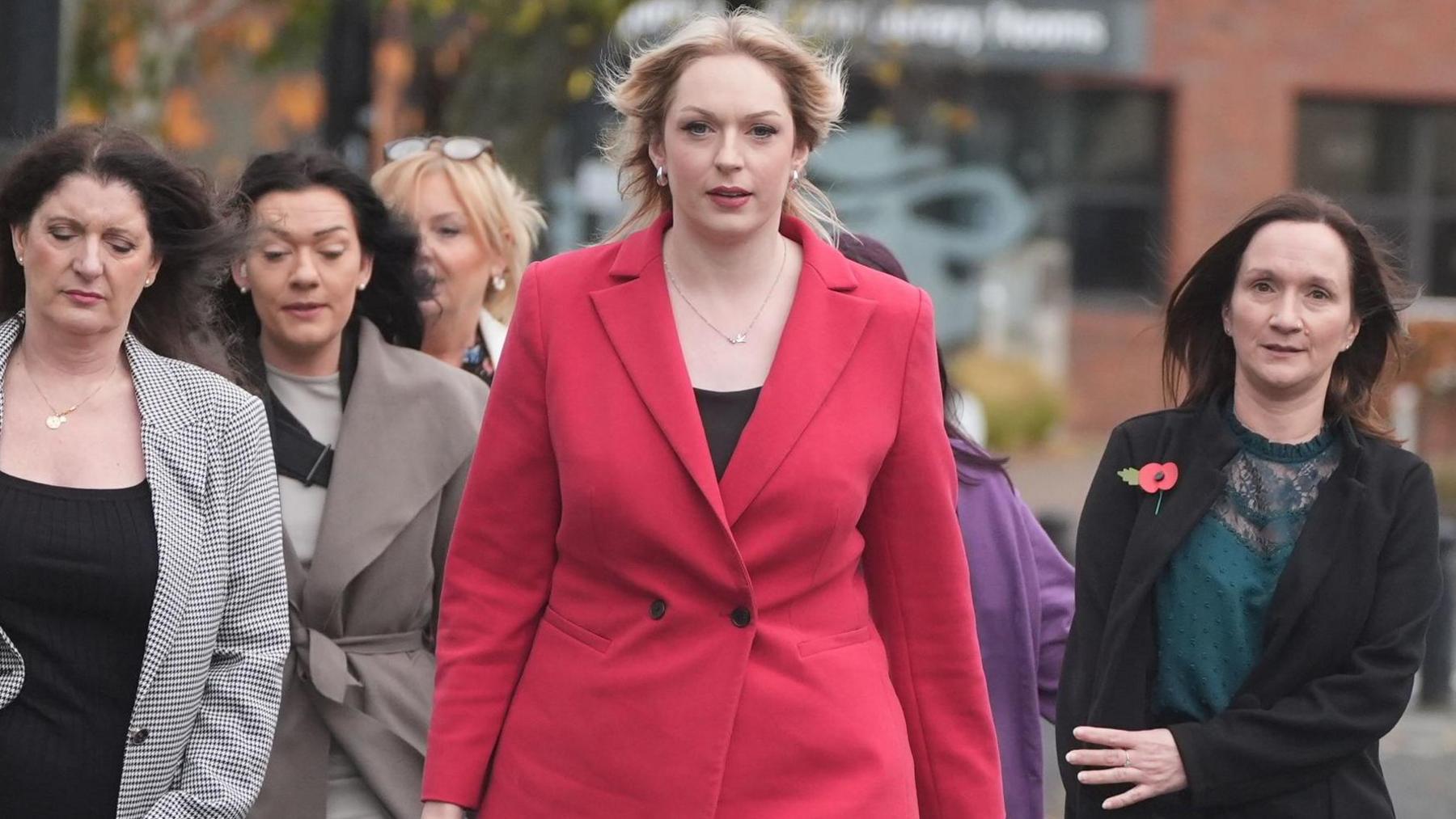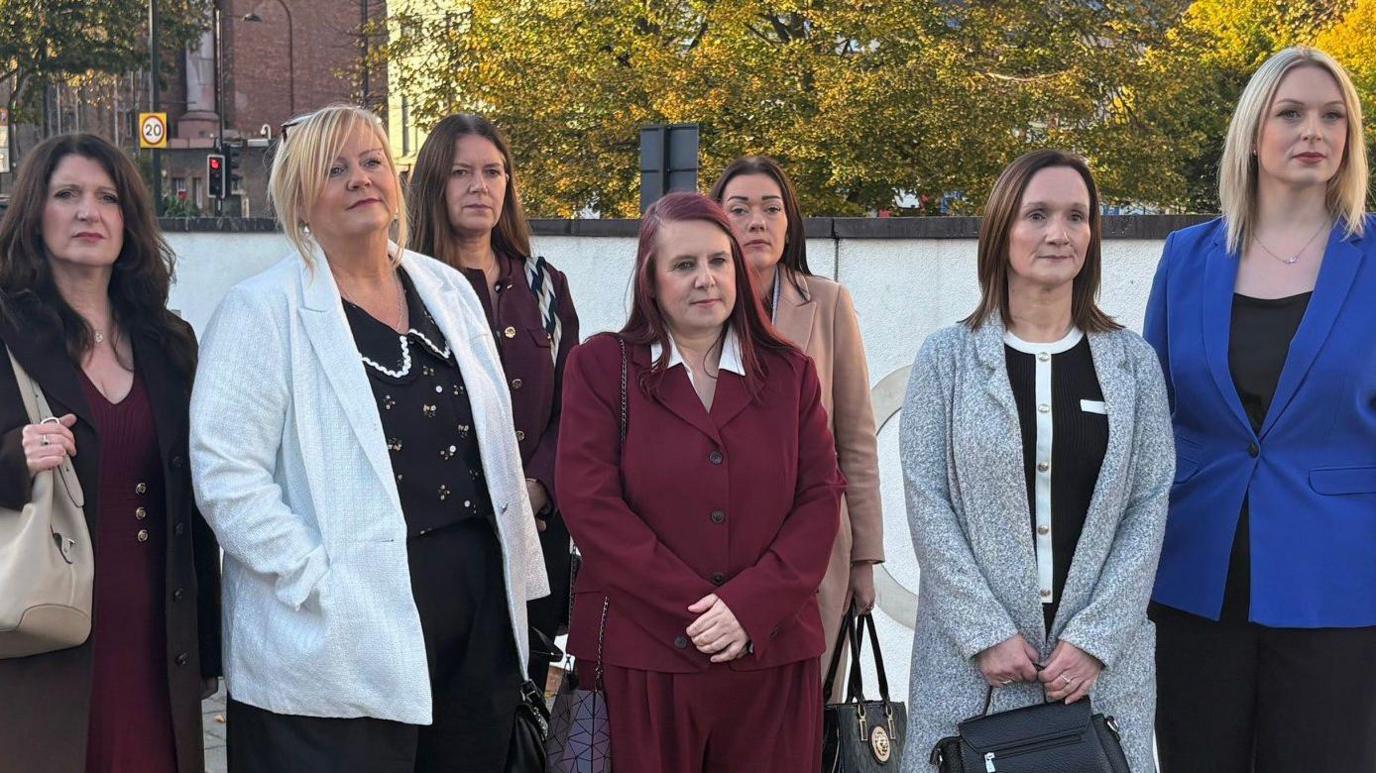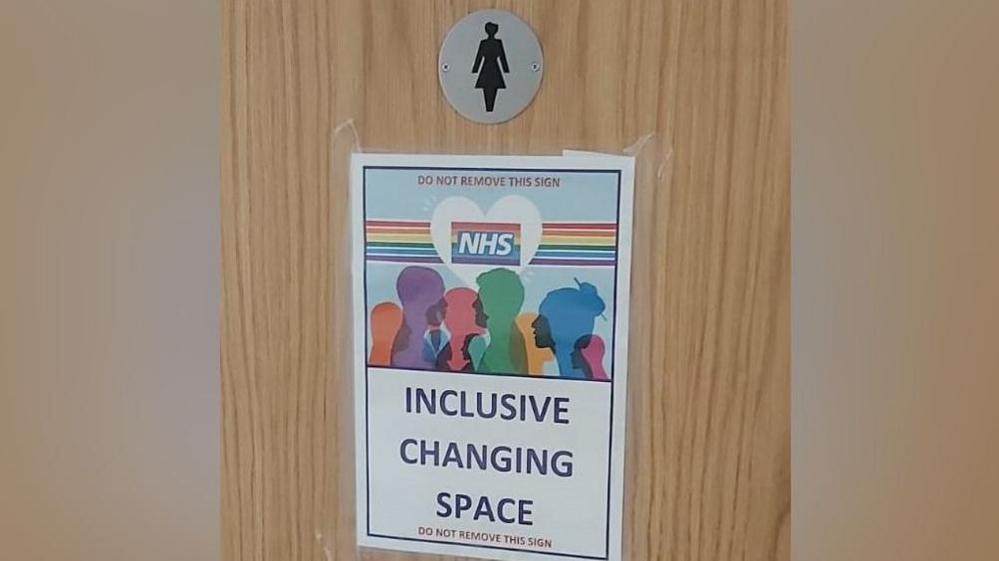Fear of men rises in changing rooms, tribunal told

Nurses from Darlington Memorial Hospital have taken their NHS bosses to an employment tribunal
- Published
Women's "rational" fear of violence from men is likely heightened in changing rooms, an employment tribunal sparked by a trans woman using a female-only hospital space has heard.
Eight nurses are challenging a policy which allows the single-sex room at Darlington Memorial Hospital to be used by Rose Henderson, a biological male who identifies as a woman.
Sociology and crime professor Jo Phoenix said research showed women's fear of "sexual predation" by men was grounded in "sex-based patterns of behaviour".
Lawyers for the County Durham and Darlington NHS Trust said Prof Phoenix was "gender critical", meaning she believed sex was "immutable", which could colour her "independence".
The tribunal has heard Rose, an operating department practitioner, had used the changing room since 2019 before complaints were first made by female nurses from the day surgery unit (DSU) in August 2023.
The trust's Transitioning In The Workplace policy allowed a person to use the single-sex space that conformed with their gender identity, and anyone of that sex who objected could change elsewhere.
Some 26 nurses signed a letter complaining of Rose's use of and conduct within the changing room, with Rose telling the tribunal the allegations, which included staring at women getting undressed, were "false".

Nurses at Darlington Memorial Hosptial have objected to Rose Henderson using the female-only changing room
Prof Phoenix, who is based at the University of Reading and has specialised in studying crime against women and girls for more than 30 years, was tasked by the nurses' legal team to answer two questions.
They were:
Are women generally more sensitive than men to being compelled to undress in front of a person of the opposite biological sex?
Are women more likely than men to suffer fear, distress and/or humiliation if compelled to undress in front of a person of the opposite biological sex?
By "compelled", Prof Phoenix said she was talking about "a requirement to change clothes in a communal changing room shared with a member of the opposite sex".
She said there was no specific research into the two questions but there was a "vast body of research" from which "inferences could be drawn".
Prof Phoenix concluded women were "likely to be more sensitive" than men about undressing in front of someone of the opposite sex and there was "strong evidence" to indicate women were "more sensitive and uncomfortable" undressing in front of anyone other than immediate intimates, regardless of sex.
She also said there was "an extremely robust criminological evidence base" from which it could be "inferred" women were far more likely than men to suffer fear and distress at being "compelled" to undress in front of a member of the opposite sex.
"Put simply," Prof Phoenix said, "women's fear of male sexual predation is rational and grounded in the realities of the pervasive risk of male violence in women's lives, and these fears are likely to be considerably heightened in the intimate setting of a changing room where women partially undress."
She said the distress was not "isolated or idiosyncratic" to the Darlington nurses, adding it was a "set of patterned and predictable responses within specific cultural and structural contexts".

Eight nurses have taken legal action over a hospital trust's changing room policy
Simon Cheetham KC, representing the trust, asked if Prof Phoenix accepted there would be some women who would not feel uncomfortable.
Prof Phoenix agreed there could be "outliers" but social research showed "well established patterns of behaviour" based on sex.
Mr Cheetham said Prof Phoenix was a member of an advisory group for Sex Matters, which was a gender critical organization that said sex was both "biological and immutable".
"I might suggest there is at least a perception your membership [of the group] affects your ability to act in an independent cause," Mr Cheetham said.
Prof Phoenix said she was "really glad" Mr Cheetham had raised the query, but said it was a "thorny issue" rooted in a "misunderstanding" of the nature of academic expertise.
She said she did hold gender critical views but they did "not cloud" her academic judgement.
Prof Phoenix said her conclusions were based on research and evidence, adding her beliefs had been "hard-wired over 30 years of knowing the realities of sexual violence in women's lives", but she had also changed her mind on issues previously.

Those involved in the tribunal all work at Darlington Memorial Hospital
Employment Judge Sweeney asked Prof Phoenix what being gender critical meant.
Prof Phoenix said it was the view that people "cannot change sex" and it was "important to recognise" that, on occasion, sex mattered more than gender identity, adding sex and gender should "not be confused".
Judge Sweeney asked the professor if there had been any research on the experiences of women "in the presence of biological males who identify as female".
Prof Phoenix said she could not think of any, but people, including herself, were now asking if gender identity "overrides sex-based patterns of social behaviour".
The tribunal continues.
Follow BBC Tees on X,, external Facebook, external, Nextdoor and Instagram, external.
Get in touch
Do you have a story suggestion for BBC Tees?
Related topics
- Published4 November

- Published3 November

- Published31 October
